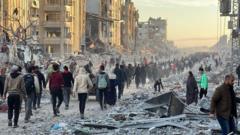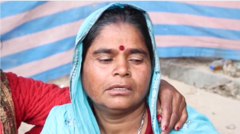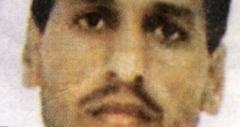With the ceasefire in effect, many Gazans are experiencing complex emotions as they navigate the ruins of their residences, with stories of loss and heartbreak emerging from the destruction of Jabalia and beyond.
Shadows of Despair: Gazans Return to Ruins After Ceasefire

Shadows of Despair: Gazans Return to Ruins After Ceasefire
Amidst a fragile ceasefire, Palestinians confront devastation as they return to the remains of their homes in Gaza.
Amidst a fragile ceasefire, Palestinians confront devastation as they return to the remains of their homes in Gaza. As they poured onto the streets of Jabalia to acknowledge the ceasefire, many found their joy overshadowed by the wreckage of their lives. Jabalia, site of the largest refugee camp in Gaza, bore witness to violent military operations that left entire neighborhoods in ruins.
Duaa al-Khalidi, a 28-year-old mother, shared her grief with BBC News as she returned to her neighborhood. She described her harrowing experience of survival, having lost her husband, mother-in-law, and sister-in-law, whose bodies remain under the rubble since the violence erupted. Al-Khalidi expressed her desire to recover the remains of her family for a dignified burial.
The devastation was further illustrated by Hussein Awda, an internationally recognized professional weightlifter, who documented his return home following the war’s outbreak. Having lost ten family members, he mourned the loss of his family and the destruction of his home and sport club, stating, “The war killed everything beautiful inside us.”
In Khan Younis, cheers and chants greeted armed Hamas fighters as they traversed the streets, while residents who had fled sought solace amidst the ruins. Ahmed Abu Ayham voiced the sentiments of many, indicating that despite the possible saving of lives due to the ceasefire, the deep-rooted pain overshadowed any celebration. “It is time that we hug one another and cry,” he said, reflecting the collective sorrow.
Reports of a return to Rafah also emerged, where residents, like Mohammed Suleiman, expressed gratitude for the ceasefire, hoping it would facilitate the return of displaced families. However, the journey is fraught with memories of loss, as journalist Muhammad al-Jamal detailed how everything he cherished, including his home, was reduced to dust.
The ceasefire, however, remains precarious; reports indicated a delay as violence erupted, with Israeli airstrikes claimed to target militant positions, raising concerns among the Gazan population regarding the longevity of the truce. Meanwhile, three Israeli female hostages were successfully returned as part of an initial phase in the ongoing negotiations.
As Gazans sift through the remnants of their lives, the fragile peace hangs in the balance, with palpable fears about what the future holds in a region marked by profound loss.
Duaa al-Khalidi, a 28-year-old mother, shared her grief with BBC News as she returned to her neighborhood. She described her harrowing experience of survival, having lost her husband, mother-in-law, and sister-in-law, whose bodies remain under the rubble since the violence erupted. Al-Khalidi expressed her desire to recover the remains of her family for a dignified burial.
The devastation was further illustrated by Hussein Awda, an internationally recognized professional weightlifter, who documented his return home following the war’s outbreak. Having lost ten family members, he mourned the loss of his family and the destruction of his home and sport club, stating, “The war killed everything beautiful inside us.”
In Khan Younis, cheers and chants greeted armed Hamas fighters as they traversed the streets, while residents who had fled sought solace amidst the ruins. Ahmed Abu Ayham voiced the sentiments of many, indicating that despite the possible saving of lives due to the ceasefire, the deep-rooted pain overshadowed any celebration. “It is time that we hug one another and cry,” he said, reflecting the collective sorrow.
Reports of a return to Rafah also emerged, where residents, like Mohammed Suleiman, expressed gratitude for the ceasefire, hoping it would facilitate the return of displaced families. However, the journey is fraught with memories of loss, as journalist Muhammad al-Jamal detailed how everything he cherished, including his home, was reduced to dust.
The ceasefire, however, remains precarious; reports indicated a delay as violence erupted, with Israeli airstrikes claimed to target militant positions, raising concerns among the Gazan population regarding the longevity of the truce. Meanwhile, three Israeli female hostages were successfully returned as part of an initial phase in the ongoing negotiations.
As Gazans sift through the remnants of their lives, the fragile peace hangs in the balance, with palpable fears about what the future holds in a region marked by profound loss.























